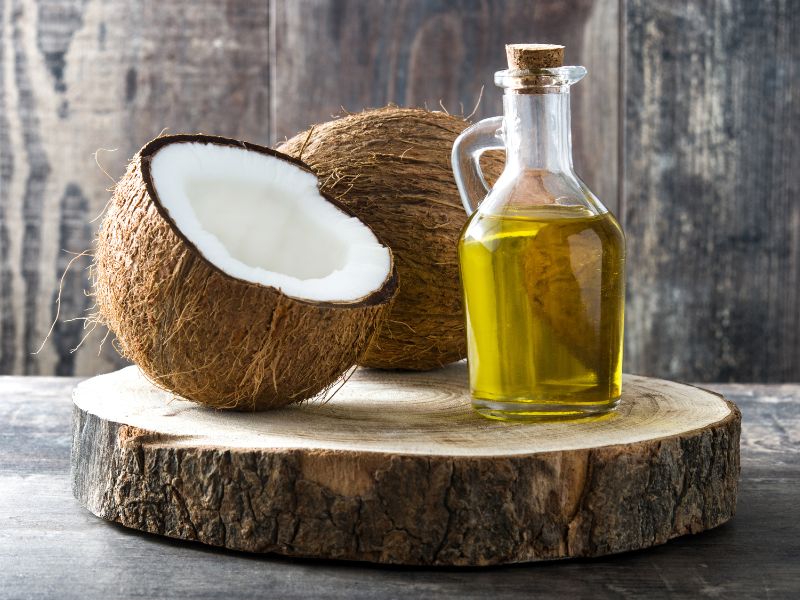Coconut oil is often hailed as a miracle ingredient in the hair care world, but it isn't universally beneficial for every hair type or condition. While it can offer deep nourishment and shine, it may also lead to dryness, buildup, or protein sensitivity in certain cases. Understanding when and how to use coconut oil for hair is crucial for maintaining healthy strands and avoiding common pitfalls. This guide explores the benefits, risks, and best practices of incorporating coconut oil into your hair routine.

Understanding Coconut Oil and Its Effects on Hair
Coconut oil penetrates the hair shaft more effectively than many other oils, thanks to its low molecular weight and high lauric acid content. This unique composition helps reduce protein loss in hair, making it a favorite in natural hair care circles. However, coconut oil isn't a one-size-fits-all solution. Factors like hair porosity, scalp health, and protein sensitivity play a major role in how your hair responds to it.
Coconut Oil Benefits for Hair
-
Strengthening and protecting the hair shaft
-
Moisture retention and frizz control
-
Common uses of coconut oil in hair treatment:
-
Hair mask for deep conditioning
-
Pre-poo treatment before shampooing
-
Daily frizz control for curly or dry hair
How Hair Porosity Affects Coconut Oil’s Effectiveness
Hair porosity refers to how well your hair can absorb and retain moisture.
-
Low porosity hair has tightly bound cuticles, which means coconut oil may sit on top and cause buildup.
-
High porosity hair absorbs coconut oil more easily, making it more effective.
-
Is coconut oil safe for low porosity hair? It can be, but only in small amounts and when properly washed out to avoid residue.

When Coconut Oil Can Help Your Hair
When used correctly and on the right hair type, coconut oil can provide noticeable improvements in hair health. From protecting strands before washing to reducing frizz and increasing shine, it's a great tool when tailored to your hair's unique needs.
Using Coconut Oil for Natural Hair
Natural hair textures, particularly those with curly and coily textures, often benefit from the emollient properties of coconut oil. It helps seal in moisture, reduce breakage, and enhance curl definition. Best methods include applying it after a water-based leave-in conditioner or blending it with other nourishing oils.
Coconut Oil as a Pre-Poo Treatment
Applying coconut oil before shampooing (pre-pooing) helps reduce protein loss and protect the hair shaft from harsh cleansers. It adds a protective layer that minimizes damage and keeps hair softer and more manageable after washing.
Deep Conditioning with Coconut Oil
Coconut oil can enhance deep conditioning treatments by improving moisture retention:
-
Mix with honey, aloe vera, or yogurt for DIY masks
-
Use heat (like a warm towel) to open cuticles for better absorption
-
Leave on for 20–45 minutes before rinsing thoroughly
Scalp Care with Coconut Oil
Thanks to its antibacterial and antifungal properties, coconut oil can be effective for scalp care:
-
Helps treat dandruff and minor scalp irritations
-
Should be applied sparingly to avoid pore clogging
-
Best used as an overnight treatment with a light wash in the morning

When Coconut Oil Can Harm Your Hair
Despite its benefits, coconut oil may cause more harm than good for some hair types. Understanding the warning signs and knowing when to avoid them is essential for healthy hair care with coconut oil.
Hair Damage from Coconut Oil
Signs that coconut oil may be damaging your hair include:
-
Increased dryness or brittleness
-
Excessive tangling
-
Loss of natural curl pattern. This often happens when coconut oil is overused or applied to hair that doesn't absorb it well.
Coconut Oil and Protein Sensitivity
Some people have protein-sensitive hair, where even natural oils like coconut can cause stiffness or dryness.
-
Protein-sensitive hair reacts poorly to products that strengthen or bind proteins
-
Coconut oil may mimic this effect, leaving hair feeling hard or crunchy
-
Alternatives like argan or sweet almond oil may be gentler
Coconut Oil Buildup on Scalp
Overuse of coconut oil can clog pores and lead to scalp issues:
-
Symptoms of buildup: Itchiness, flakes, greasy residue
-
How to avoid it:
-
Use coconut oil only 1–2 times per week
-
Wash thoroughly with a clarifying shampoo
-
Avoid applying directly to the scalp unless for targeted treatments

Hair Care Tips for Healthier Results
Maximize the benefits of coconut oil by applying it strategically and observing how your hair responds. Pairing it with other good hair habits can prevent potential downsides.
Start With a Clean Scalp
Coconut oil locks in whatever is on your scalp, including dirt and product residue. Begin with a clean base:
-
Use a sulfate-free clarifying shampoo before applying
-
Exfoliate the scalp weekly to remove dead skin cells
Seal in Moisture the Right Way
Coconut oil should follow a water-based moisturizer to trap hydration in the hair shaft:
-
Apply to damp hair, focusing on mid-lengths and ends
-
Great for protective styles like braids or twists
Use Coconut Oil Sparingly
A little goes a long way. Too much coconut oil can lead to greasiness and buildup:
-
Use a pea-sized amount for short hair and a dime-sized amount for longer strands
-
Warm it between your palms before applying
Monitor Hair’s Reaction
Every head of hair is unique. Track how yours responds to coconut oil:
-
Keep a journal to note any changes in texture or moisture levels
-
Adjust frequency and amount based on results

Coconut oil can be a powerful ally or a hidden enemy in your hair care routine. Understanding your hair type, porosity, and sensitivity levels is key to using it effectively. Whether you're sealing moisture into curls or battling buildup on the scalp, making informed choices about how and when to use coconut oil ensures your hair stays strong, shiny, and healthy.
Check also:
-
Which Oil Is Best for Hair? Top Picks for Every Hair Concern
-
A Comprehensive List of Ingredients to Avoid in Natural Hair Products
FAQs
1. When should you avoid using coconut oil on hair?
Avoid using coconut oil if you have low porosity or protein-sensitive hair. These hair types may experience dryness, brittleness, or buildup because coconut oil can block moisture from entering the hair shaft.
2. Is coconut oil safe for low porosity hair?
Coconut oil is generally not ideal for low porosity hair because it tends to sit on top of the hair rather than absorb, leading to buildup and dryness. Lighter oils, such as argan or grapeseed, may work better for this hair type.
3. How can I use coconut oil properly for hair health?
Use coconut oil sparingly and only on clean, damp hair. It’s most effective as a pre-poo treatment or as part of a deep conditioning routine. Focus on mid-lengths to ends and avoid overusing it on the scalp unless treating a specific issue.
4. What are the signs that coconut oil is damaging my hair?
If your hair feels dry, stiff, or breaks more easily after using coconut oil, it could be a sign that it’s not compatible with your hair type. Look out for flaking, clogged pores, or an itchy scalp as well.
5. Can coconut oil help with scalp care?
Yes, coconut oil has antibacterial and antifungal properties that can support scalp health. Use it in moderation for scalp massage or to soothe dryness, but be cautious of buildup if not rinsed properly.

If you’re ready to experience the true benefits of coconut oil and other natural ingredients without the guesswork, trust REV-320 to support your hair care journey. Our expertly formulated natural hair care products are crafted to nourish your scalp, enhance moisture retention, and protect your strands, especially when used properly based on your hair type and porosity. Whether you're looking to strengthen natural curls or treat scalp buildup gently, REV-320 has you covered. Contact us or order online today and give your hair the care it deserves!


